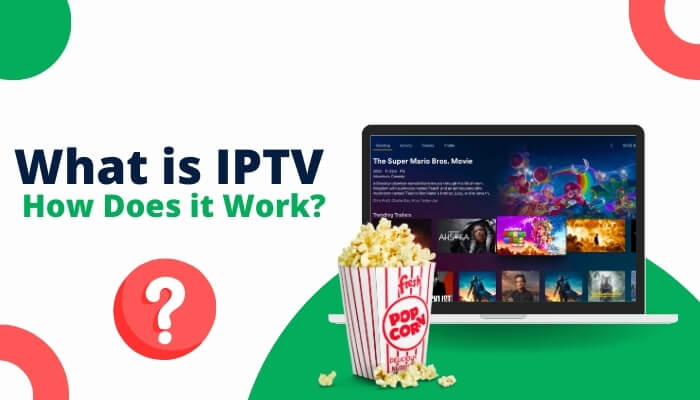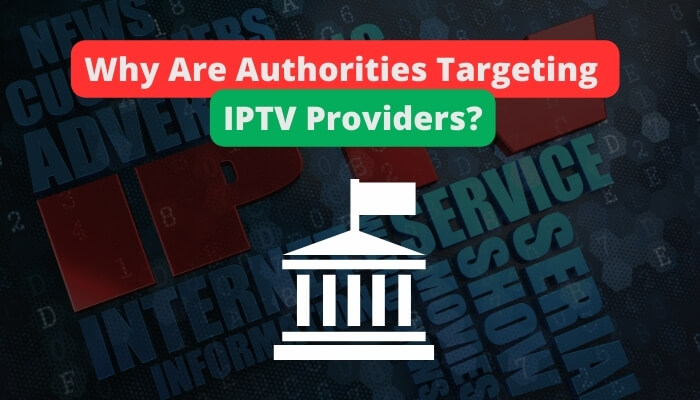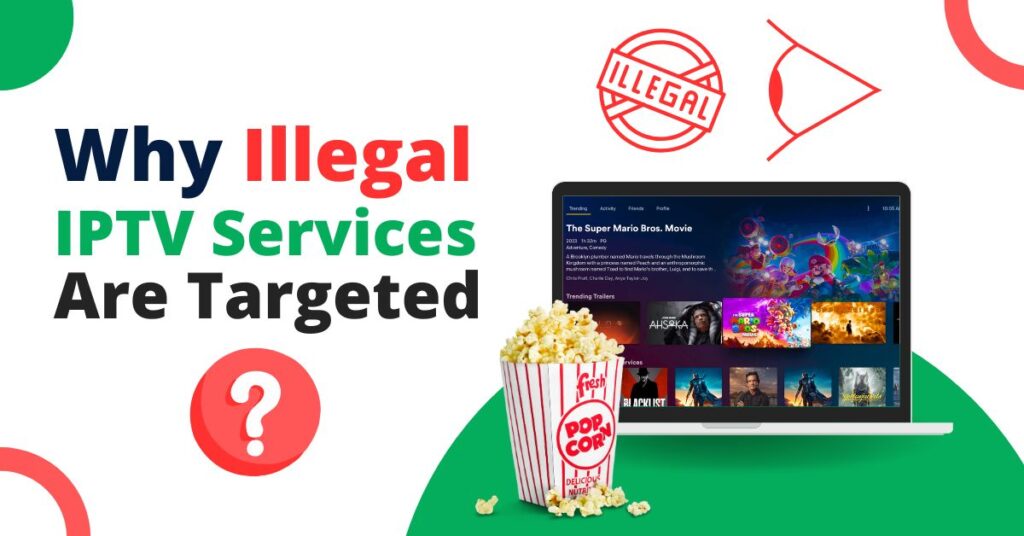Blog
Why Illegal IPTV Services Are Targeted
Internet Protocol Television (IPTV) has revolutionised how people consume media, offering an affordable and accessible alternative to traditional broadcasting. Unlike conventional methods, IPTV allows users to stream live television, on-demand content, and movies via an internet connection. Its rise in popularity stems from the growing availability of high-speed internet and the shift from physical media to digital streaming platforms.
However, this rise has also attracted attention from authorities due to the proliferation of illegal IPTV streaming services. These unauthorised providers offer premium content at significantly reduced costs, depriving content creators and legal platforms of revenue. Organisations like the Alliance for Creativity and Entertainment (ACE) and the Motion Picture Association (MPA) have responded with coordinated anti-piracy coalition efforts to curb IPTV piracy.
The impact of these measures has been substantial, with major IPTV platforms shut down globally. High-profile raids and legal actions have dominated IPTV shutdown news, highlighting the severity of the issue. These efforts signal an ongoing streaming piracy crackdown as governments and media corporations prioritise media piracy enforcement and digital content protection. This article explores the workings of IPTV, the difference between legal and illegal services, and the consequences of these IPTV legal crackdowns.
What is IPTV and How Does it Work?
Definition of IPTV
IPTV (Internet Protocol Television) delivers television content through an internet protocol network, unlike traditional cable or satellite formats. It allows viewers to access:
- Live TV broadcasts
- On-demand videos
- Recorded content
IPTV provides flexibility for users to watch media on multiple devices, including smart TVs, smartphones, and computers.

Legal IPTV vs. Illegal IPTV
Not all IPTV services are legal.
- Legal IPTV subscription services: Platforms like Netflix, Amazon Prime Video, and Disney+ provide licensed content for a fee.
- Illegal IPTV streaming services: These platforms offer pirated content, often including live sports, movies, and premium TV shows, at lower prices without proper licensing.
How Illegal IPTV Providers Operate
Illegal providers exploit technology to broadcast unauthorised content. Here’s how they work:
- Obtaining content: They bypass encryption and stream premium content directly from legitimate platforms.
- Reselling subscriptions: They offer cheaper IPTV subscription services to attract customers.
- Anonymous payment methods: Payments are often made through cryptocurrency to evade detection.
This form of IPTV piracy has resulted in significant revenue losses for legal platforms, pushing authorities like ACE anti-piracy to prioritise streaming piracy crackdowns. Through media piracy enforcement, major IPTV platforms shutdown operations globally, marking a strong stand in protecting digital content.
The continued Motion Picture Association crackdown signals the urgency of tackling this growing issue and the harsh IPTV legal consequences faced by those involved.
The Rise of IPTV Piracy
The surge in IPTV piracy can be attributed to a combination of factors, primarily driven by consumer demand and economic challenges.
Factors Contributing to IPTV Piracy
- Increasing Streaming Service Costs:
Legitimate IPTV subscription services such as Netflix, Amazon Prime, and Disney+ continue to raise prices. For many users, subscribing to multiple platforms to access desired content has become economically unfeasible. - Availability of Pirated Content:
Illegal IPTV streaming services offer premium content, including live sports, movies, and TV shows, at a fraction of the cost. These platforms provide extensive libraries that cater to users’ needs at minimal prices, making them a popular alternative.

Global IPTV Usage Statistics
The rise of IPTV piracy is reflected in global statistics:
- Over 12% of internet users worldwide consume pirated IPTV content regularly.
- In the UK alone, illegal IPTV services account for nearly 10% of all streaming activity.
- A 2023 report estimated that the streaming piracy crackdown saved legitimate content platforms billions in potential losses.
As media piracy enforcement intensifies, the demand for affordable and legal solutions becomes critical. Authorities, supported by the anti-piracy coalition and organisations like ACE anti-piracy, continue to dismantle illegal networks, but the popularity of these services persists. The growing IPTV shutdown news highlights a global challenge as users look for cost-effective ways to access content.
Major IPTV Crackdowns and Shutdowns in Recent Years
Case 1: ACE Shutdown of Uptobox and Uptostream
- Uptobox and Uptostream, two prominent illegal IPTV streaming services, operated for over 10 years and garnered 1.5 billion visits globally.
- The anti-piracy coalition, led by ACE anti-piracy, included major corporations such as Disney, Netflix, and Apple.
- The shutdown marks a significant win in digital content protection and reinforces the importance of global media piracy enforcement.
Case 2: UK’s Flawless IPTV Crackdown
- Flawless IPTV, a large-scale operation in the UK, illegally streamed premium sports and entertainment content.
- £7 million profit was made by the group, with over 50,000 subscribers accessing the service.
- Following a Motion Picture Association crackdown, the operators faced severe IPTV legal consequences, receiving combined prison sentences of 30 years.
Case 3: Argentina’s Digital TV Raid
- Digital TV, an illegal IPTV platform, was raided in Argentina.
- The service had:
- 85,000 customers
- Access to 900 live channels, 8,000 movies, and 400 TV shows.
- Authorities’ streaming piracy crackdown dismantled the platform, sending a strong message about digital content protection.
Case 4: European Shutdown of Xstream-Codes.com
- Xstream-Codes.com enabled criminals to operate IPTV piracy networks across Europe.
- Law enforcement from Italy, Netherlands, and France collaborated in this anti-piracy coalition operation.
- The platform served over 50 million users worldwide before its closure.
- This case exemplifies how IPTV platforms shutdown can significantly disrupt piracy ecosystems.
Case 5: Danish and Greek Arrests
- Authorities in Denmark arrested individuals involved in credential theft and resale of IPTV login data.
- In Greece, police shut down an operation that ran for 8 years, generating €25 million in profits.
- These cases highlight the growing impact of media piracy enforcement in tackling illegal IPTV streaming services.
Why Are Authorities Targeting IPTV Providers?
Authorities are aggressively targeting IPTV piracy due to its substantial economic and legal impact on the media industry.
Economic Losses for Content Creators and Streaming Platforms
Illegal IPTV streaming services significantly harm legitimate content creators and platforms.
- Streaming giants like Netflix, Disney+, and Amazon Prime lose billions in potential revenue each year.
- The unauthorised distribution of content reduces incentives for creators to produce new, high-quality media.
The rise of IPTV subscription services offering pirated content at a fraction of the cost attracts users who might otherwise pay for legal platforms. This translates into direct financial losses for broadcasters, studios, and streaming platforms.

The Role of Anti-Piracy Organisations Like ACE
The Alliance for Creativity and Entertainment (ACE), an anti-piracy coalition, leads efforts to shut down illegal IPTV networks.
- Supported by global media corporations like Apple, Sony, and NBCUniversal, ACE works to protect digital content and uphold intellectual property laws.
- Their successful crackdowns, such as IPTV platforms shutdown operations, aim to dismantle piracy infrastructure worldwide.
Government Partnerships with Private Corporations
Government agencies increasingly collaborate with private media corporations to tackle IPTV piracy:
- Legal frameworks are being strengthened to enforce media piracy enforcement.
- Governments coordinate raids, seize assets, and impose severe IPTV legal consequences on offenders.
This combined effort ensures large-scale streaming piracy crackdowns are effective, signalling to illegal providers that their actions will not go unpunished.
Authorities’ persistent focus on IPTV piracy reflects the urgent need to protect legitimate media industries, curb revenue loss, and maintain the integrity of digital content protection. However, despite these efforts, piracy remains a complex challenge due to technological advancements and user demand.
Challenges in Eliminating IPTV Piracy
Eliminating IPTV piracy is a complex and ongoing challenge for authorities and content creators worldwide.
The “Hydra Effect”: New Providers Emerge After Shutdowns
One of the biggest challenges is the “Hydra Effect”:
- When one illegal IPTV streaming service is shut down, multiple new providers quickly emerge to take its place.
- Piracy networks adapt rapidly by using alternative servers, domains, and payment methods to evade detection.
- High-profile IPTV platforms shutdown cases highlight the persistent nature of piracy despite coordinated streaming piracy crackdowns.
Difficulty in Tracking IPTV Networks
Illegal IPTV providers operate in sophisticated and decentralised networks:
- They often use encrypted servers, anonymous payment systems like cryptocurrency, and cloud-based technologies.
- This makes it extremely difficult for authorities to locate, monitor, and dismantle these networks.
- Furthermore, many operations span multiple countries, requiring international cooperation and legal coordination.
Even with the involvement of anti-piracy coalitions like ACE anti-piracy and global authorities, staying ahead of piracy technologies remains a significant challenge.
User Demand Driven by High Subscription Costs
A key factor sustaining IPTV piracy is user demand:
- The rising costs of IPTV subscription services push consumers to seek cheaper alternatives.
- Users are often willing to take risks to access premium content at reduced prices.
Until legal streaming platforms address affordability and provide value-driven options, demand for illegal IPTV streaming services will persist.
While media piracy enforcement has achieved some success, eliminating IPTV piracy entirely will require long-term efforts, technological advancements, and solutions that address both provider operations and user demand. The persistence of piracy underscores the need for innovative approaches to digital content protection.
Impact on Consumers and the Streaming Industry
The ongoing streaming piracy crackdown has significant short- and long-term effects on consumers and the broader streaming industry.
Short-Term Effects: Loss of Access for IPTV Users
For users relying on illegal IPTV streaming services, crackdowns result in immediate disruptions:
- Users lose access to premium content, including live sports, movies, and TV shows.
- Money spent on subscriptions to these IPTV platforms is non-refundable, leaving customers at a loss.
While IPTV platforms shutdown may inconvenience users, it also raises awareness about the risks of accessing pirated content.
Long-Term Outcomes: Rising Awareness and Legal Alternatives
The shutdown of illegal services highlights the importance of supporting legal platforms:
- Consumers are becoming more aware of the IPTV legal consequences and potential risks, including malware and data theft.
- Streaming platforms like Netflix, Disney+, and Amazon Prime are introducing flexible options and bundles to provide better value.
Influence on Streaming Services’ Pricing and Policies
Crackdowns put pressure on legitimate platforms to address user concerns:
- Some platforms may adjust pricing or introduce affordable plans to retain subscribers.
- Companies are investing in digital content protection and enhancing security to prevent piracy.
Ultimately, the fight against IPTV piracy benefits content creators, legal platforms, and consumers in the long run, fostering a fair and sustainable streaming ecosystem. However, addressing user demand remains critical to reducing piracy’s appeal.
Future of IPTV Crackdowns
The future of IPTV piracy enforcement is expected to witness more advanced and coordinated efforts to combat illegal streaming.
Predicted Trends in Anti-Piracy Enforcement
- Authorities and organisations like ACE anti-piracy will continue to collaborate internationally, targeting large-scale piracy networks.
- Enhanced media piracy enforcement will leverage technology, such as artificial intelligence, to detect and dismantle illegal operations more efficiently.
- Real-time monitoring of IPTV subscription services and payment tracking will make piracy networks harder to sustain.
Potential Strategies to Combat Piracy
- Stronger Legislation: Governments may introduce stricter laws, increasing IPTV legal consequences for offenders.
- Improved Consumer Education: Raising awareness about the risks of illegal IPTV streaming services will help discourage usage.
- Affordable Legal Alternatives: Streaming services must address pricing concerns to attract users who turn to piracy due to cost.
The ongoing streaming piracy crackdowns demonstrate significant progress, but combating IPTV piracy requires continuous innovation, cooperation, and a balanced approach to meet user demand for accessible content.
Frequently Asked Questions (FAQs)
What is IPTV piracy?
IPTV piracy refers to the unauthorised distribution of premium TV shows, movies, and live broadcasts through illegal IPTV streaming services. These platforms provide content without proper licensing, depriving creators of revenue.
Why are IPTV providers being shut down?
Authorities target IPTV platforms because they cause massive economic losses for content creators and legitimate streaming services. Crackdowns, led by organisations like ACE anti-piracy, aim to protect digital content and enforce intellectual property rights.
Is using IPTV legal?
Using legal IPTV subscription services such as Netflix or Amazon Prime is completely legal. However, accessing illegal IPTV streaming services that distribute pirated content is illegal and can result in severe IPTV legal consequences.
What alternatives exist to illegal IPTV?
Consumers can opt for affordable legal alternatives such as:
- Ad-supported streaming services (e.g., free tiers of platforms).
- Bundled subscriptions offering cost-effective packages.
- Promotional offers provided by legitimate streaming services.
Supporting legal platforms ensures creators are compensated fairly and helps sustain the streaming industry.
Conclusion
The fight against IPTV piracy remains a critical priority for governments, content creators, and anti-piracy organisations like ACE anti-piracy. The shutdown of illegal IPTV streaming services highlights the significant impact piracy has on the media industry, depriving creators and legitimate platforms of revenue.
While streaming piracy crackdowns have successfully disrupted piracy networks, challenges persist due to user demand and the rapid emergence of new providers. Balancing effective media piracy enforcement with providing affordable, accessible legal alternatives is essential to reduce piracy’s appeal.Ultimately, fostering awareness among consumers about the risks of IPTV platforms shutdown and the importance of digital content protection will contribute to a fair and sustainable streaming ecosystem. By prioritising innovation and cooperation, the industry can continue to address piracy while ensuring users have access to legitimate, high-quality content.

